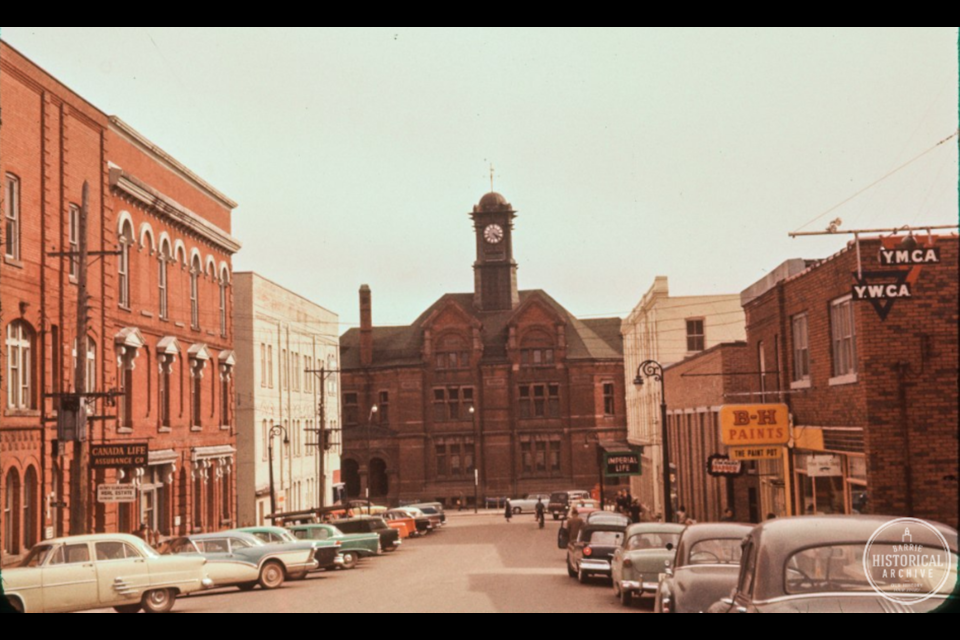This is the first of a two-part Remember This. Watch for Part 2 next Saturday.
“Barrie Feed and Seed is now open for business at 12 Owen Street. Full line of feed, flour, seeds and Purina Chows. We buy grain and seed. Prompt delivery anywhere in Simcoe County.”
This hopeful ad appeared in the April 17, 1930 edition of the Northern Advance. Robert J. Elliott and his business partner, both former Purina salesmen, must have been excited to open up their own shop.
Unfortunately, the venture was short lived. Robert Elliott got a little sidetracked when he found himself on trial for murder.
Elizabeth Sproule was the daughter of an Irish-born farmer who had settled in Darlington Township in Durham County. When Elizabeth was 20 years old, she married Thomas King, a farmer from Tiny Township, and she went to live there. The couple raised a son and a daughter, Cleophus and Velma.
In 1927, Thomas King died. In his lifetime, the shrewd farmer had invested in his own acreage but also in local small businesses. The result was that his widow, Elizabeth, was well taken care of financially.
The following year, the widow married again. She wed David Hisey, a widower stonemason from near Uxbridge, Ont. Well, he was sort of a widower. His first wife, Mabel, died in 1921 but she had long been remarried to someone else.
In any case, things didn’t work out with David and by 1930 Eliza was on her own again. Just her and a bank account stuffed full of money.
Much like her late first husband, Elizabeth Hisey looked for good investments. In 1930, she started keeping company with a younger man – much to the chagrin of her grown children – a charming travelling seeds salesman by the name of Robert Elliott. Soon, she was a silent partner in his new shop in Barrie.
Next up was Mrs. Hisey’s acquisition of a rather run-down hotel in Waubaushene known as Palmer House. This had been one of Thomas King’s investments and he had sunk $3,000 dollars into the hotel. When the owner couldn’t repay the investment to Mr. King’s estate, his widow, Eliza Hisey, became the owner.
Robert Elliott acted as the hotel business manager during the handover process and was the foreman in charge of the workmen hired to renovate the place. Later on, he was also made the chief beneficiary of Elizabeth Hisey’s will as well as the executor. A very busy man indeed.
As the previous hotel owner had cleared out all but a few beds, new furnishings had to be purchased. Mrs. Hisey doubled the insurance on the building and added contents insurance even though there was little of that to insure.
Soon, the man in charge of everything suggested that he could use an assistant. Elliott introduced an acquaintance, Gordon Gastle, who was reportedly an excellent handyman. As far as Mrs. Hisey was concerned, a friend of Robert was a friend of hers, and he was hired on the spot. Gastle was also appointed chauffeur.
On Dec. 16, 1930, only a month into the renovation process, Mrs. Hisey and Gordon Gastle decided to stay the night in two hotel rooms after an extra long work day. In the morning, only the brick chimney stood, surrounded by bed springs and twisted metal. The Palmer House had burned to the ground.
Both Hisey and Gastle escaped the blaze and were unharmed. Elizabeth Hisey barely made it out of the burning building through a back window and was quite shaken by the ordeal. It was after this that Mrs. Hisey decided to have a new will made. Her last will, created in 1928 by barrister J.R. Boys of Barrie, was replaced by one written by Robert Elliott and handled by Adam Ingram, a Midland barrister.
January of 1931 was spent sorting out insurance affairs. Mrs. Hisey cashed several cheques, each for thousands of dollars, deposited them in her bank account and then transferred quite a bit of it to Robert Elliott.
When February arrived, Elizabeth Hisey needed a break and suggested a little holiday. Maybe a short getaway, far from the scene of so much stress and trauma, would be the best thing.
It wasn’t.
Each week, the Barrie Historical Archive provides BarrieToday readers with a glimpse of the city’s past. This unique column features photos and stories from years gone by and is sure to appeal to the historian in each of us.



